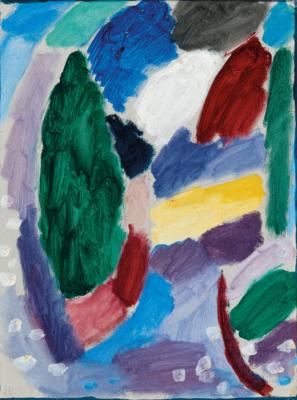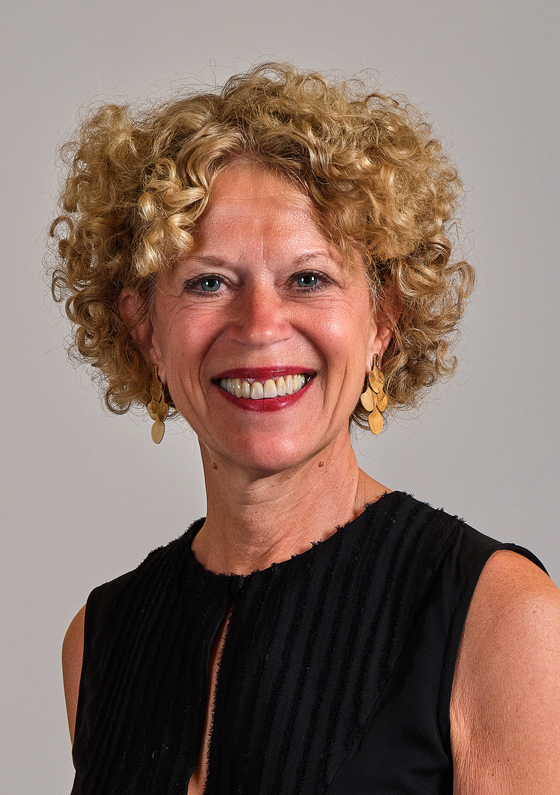Alexej von Jawlensky

(Torschok 1864–1941 Wiesbaden)
Variation, Winter, 1915, No 54, monogrammed A. J., oil on linen structured paper, 36.2 x 27.2 cm, on cardboard, 44.7 x 33.7 cm, on the reverse signed, dated, inscribed A. Jawlensky, 1915, n. 54 (faded), Winter L (strikethrough) with orange colored pencil, lower right 316. Stamp Dr. Joseph Drexel Nürnberg Marienplatz 5, numbered 6 in orange approx. from Lisa Kümmel and no 316 in blue colored pencil from another hand, framed
After the outbreak of the First World War, Jawlensky, as a Russian citizen, was forced to flee Germany together with his family. Within a very short time, he had to leave behind his life and all his possessions. The family found refuge in Saint Prex on Lake Geneva. His life changed quite suddenly. From a turbulent, luxurious lifestyle, made possible for him by his patroness Marianne von Werefkin, he went quite suddenly into a politically enforced isolation.
The view out of his window, of a world that continued to turn without him, became a motif for the series of works that include Variation: Winter, 1915 No. 54. The changes in nature over the seasons, but also the change in Jawlensky’s state of mind over the course of his prolonged exile, are visible in the series of works. As time progresses, his expressionist style continues to develop. With the ‘Variations on a Land-scape Theme’, Jawlensky continued his artistic development and laid the groundwork for his later portraits, the ‘Abstract Heads’.
Variation: Winter, 1915 No. 54 is part of an important series in the painter’s oeuvre. Jawlensky made use of the exile and his social isolation to develop his artistic practice and created a new era in his work with what was available to him at the time. The imposed isolation and the view out of the window as the only experience of day-to-day life are strongly reminiscent of the current pandemic. Jawlensky survived this difficult time and found refuge in art.
The ‘Variations on a Landscape Theme’ are a testament to man’s perseverance, his ability to endure and to learn from prolonged difficulties. Variation: Winter, 1915 No. 54 is a sign of such a time and is an example of successful handling of a crisis – and is, moreover, a colourful, luminous, glimmer of hope.
“Initially, I wanted to continue working in St. Prex as I had done in Munich. But something inside me stopped me from painting the colourful, sensual pictures I had painted before. My soul had changed after so much suffering, and that meant I had to find other forms and colours to express myself. I began to paint what I called my ‘variations on a landscape theme’ that I saw from my window – few trees, a path and the sky.”
Alexej Jawlensky, Memoirs, 1937
Certificate:
Alexej von Jawlensky-Archiv, Angelica Jawlensky-Bianconi, Muralto, Switzerland, 22 December 2021
Provenance:
Collection Dr. Joseph Drexel, Nurnberg
Private Collection, Munich – aquired from the estate of the previous owner
Exhibited:
Palais Electoral Plainpalais, Exposition Internationale d’Art Moderne, Geneva, 26 December 1920 – 25 January 1921 (according to the information from Angelica Jawlensky-Bianconi)
Specialist: Dr. Petra Maria Schäpers
 Dr. Petra Maria Schäpers
Dr. Petra Maria Schäpers
+49 211 2107747
petra.schaepers@dorotheum.de
31.05.2022 - 17:00
- Realized price: **
-
EUR 153,000.-
- Estimate:
-
EUR 120,000.- to EUR 160,000.-
Alexej von Jawlensky
(Torschok 1864–1941 Wiesbaden)
Variation, Winter, 1915, No 54, monogrammed A. J., oil on linen structured paper, 36.2 x 27.2 cm, on cardboard, 44.7 x 33.7 cm, on the reverse signed, dated, inscribed A. Jawlensky, 1915, n. 54 (faded), Winter L (strikethrough) with orange colored pencil, lower right 316. Stamp Dr. Joseph Drexel Nürnberg Marienplatz 5, numbered 6 in orange approx. from Lisa Kümmel and no 316 in blue colored pencil from another hand, framed
After the outbreak of the First World War, Jawlensky, as a Russian citizen, was forced to flee Germany together with his family. Within a very short time, he had to leave behind his life and all his possessions. The family found refuge in Saint Prex on Lake Geneva. His life changed quite suddenly. From a turbulent, luxurious lifestyle, made possible for him by his patroness Marianne von Werefkin, he went quite suddenly into a politically enforced isolation.
The view out of his window, of a world that continued to turn without him, became a motif for the series of works that include Variation: Winter, 1915 No. 54. The changes in nature over the seasons, but also the change in Jawlensky’s state of mind over the course of his prolonged exile, are visible in the series of works. As time progresses, his expressionist style continues to develop. With the ‘Variations on a Land-scape Theme’, Jawlensky continued his artistic development and laid the groundwork for his later portraits, the ‘Abstract Heads’.
Variation: Winter, 1915 No. 54 is part of an important series in the painter’s oeuvre. Jawlensky made use of the exile and his social isolation to develop his artistic practice and created a new era in his work with what was available to him at the time. The imposed isolation and the view out of the window as the only experience of day-to-day life are strongly reminiscent of the current pandemic. Jawlensky survived this difficult time and found refuge in art.
The ‘Variations on a Landscape Theme’ are a testament to man’s perseverance, his ability to endure and to learn from prolonged difficulties. Variation: Winter, 1915 No. 54 is a sign of such a time and is an example of successful handling of a crisis – and is, moreover, a colourful, luminous, glimmer of hope.
“Initially, I wanted to continue working in St. Prex as I had done in Munich. But something inside me stopped me from painting the colourful, sensual pictures I had painted before. My soul had changed after so much suffering, and that meant I had to find other forms and colours to express myself. I began to paint what I called my ‘variations on a landscape theme’ that I saw from my window – few trees, a path and the sky.”
Alexej Jawlensky, Memoirs, 1937
Certificate:
Alexej von Jawlensky-Archiv, Angelica Jawlensky-Bianconi, Muralto, Switzerland, 22 December 2021
Provenance:
Collection Dr. Joseph Drexel, Nurnberg
Private Collection, Munich – aquired from the estate of the previous owner
Exhibited:
Palais Electoral Plainpalais, Exposition Internationale d’Art Moderne, Geneva, 26 December 1920 – 25 January 1921 (according to the information from Angelica Jawlensky-Bianconi)
Specialist: Dr. Petra Maria Schäpers
 Dr. Petra Maria Schäpers
Dr. Petra Maria Schäpers
+49 211 2107747
petra.schaepers@dorotheum.de
|
Buyers hotline
Mon.-Fri.: 10.00am - 5.00pm
kundendienst@dorotheum.at +43 1 515 60 200 |
| Auction: | Modern Art |
| Auction type: | Saleroom auction with Live Bidding |
| Date: | 31.05.2022 - 17:00 |
| Location: | Vienna | Palais Dorotheum |
| Exhibition: | 21.05. - 30.05.2022 |
** Purchase price incl. buyer's premium and VAT
It is not possible to turn in online buying orders anymore. The auction is in preparation or has been executed already.
